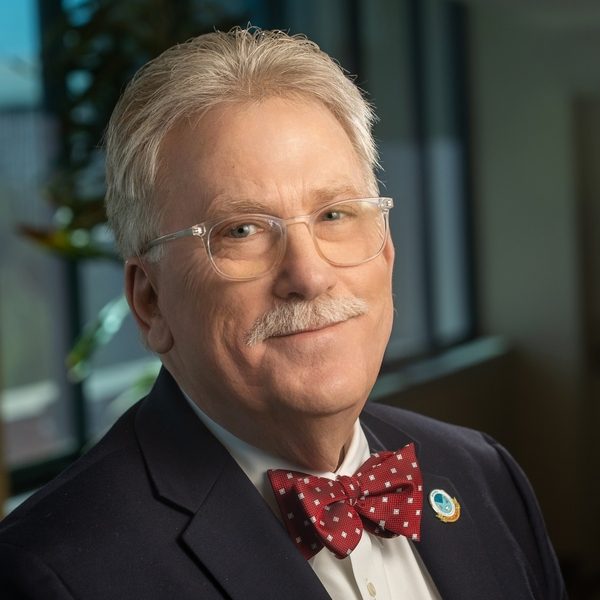Whew! The heatwave gripping our country is simply oppressive. Am I glad I have an indoor job! It makes me appreciate even more those citizens who not only brave the weather for their jobs, but who also work under difficult conditions. Utility workers, fire fighters, police officers, highway construction workers and so many others work for our collective good. I think it is safe to say that we should think of them and what they do for us as our advocates.
Those thoughts lead me to consider the advocates we have here within the College who seek to help us be better allergists/immunologists for our patients and help us with the increasingly complex (and sometimes frustrating) burdens associated with our profession and our practices. I am talking about our Advocacy Council. This assembly of people work tirelessly and effectively to address individual and group needs associated with rules, regulations and policies that affect how we practice, reimbursement for our efforts and impediments to various aspects of care for our patients.
The College’s Advocacy Council regularly keeps tab on the pulse of our specialty at governmental and professional levels. Overall governance and guidance are provided by the Advocacy Council led by Travis Miller, MD, FACAAI (chair), J. Wesley Sublett, MD, FACAAI (vice chair) and Kelly Maples, MD, FACAAI (treasurer). Other Advocacy Council Board of Directors members include Warner Carr, MD, FACAAI (immediate past chair), Nicole Chase, MD, FACAAI, Amar Dixit, MD, MBA, FACAAI, Steve Dorman, MD, FACAAI, Andrej Petrov, MD, FACAAI, Melinda Rathkopf, MD, MBA, FACAAI and Madeleine Ramos, MD, FACAAI. James Tracy, DO, FACAAI (ACAAI president-elect) and I serve as ex-officio members. These talented and committed members work together tirelessly to advocate for us on a variety of issues. The glue that holds our advocacy efforts together is provided by two people – J. Allen Meadows, MD, FACAAI serves as Executive Director of Advocacy and Governmental Affairs. His term runs through 2026, and he has the professional well-being of all College members, our specialty and our patients square on his radar. He is doing an amazing job. The “behind-the-scenes” glue that holds all of this together is from the College staff – Sue Grupe, Director of Advocacy Administration. She is a wonderful resource to all of us involved in advocacy.
I will admit that before I became involved in College leadership, I sometimes wondered what specific things the Advocacy effort did for our profession and our practices. The Advocacy Council, along with Dr. Meadows and Ms. Grupe, are a force to be reckoned with by those policy makers who would impede our practices – whether intentional or not. I was excited this year to participate in some of those efforts – specifically the Strike Force in May. Several members of the Advocacy Council and other College members converged in Washington DC to visit with multiple Congresspeople and let them know about “hot button” items affecting our practices and patients. Capitol Associates, our Washington advisors, know those in key positions that elevate our advocacy efforts to the top. The Strike Force was an extraordinarily well-organized effort and I received (on behalf of the College) several notes from congressional staff thanking us for our efforts in getting them these important advocacy messages.
What has the Advocacy Council been doing? Read the list of how this group works for you. More details appear on the College’s Advocacy web page.
ALTERNATIVE PAYMENT MODELS
- Recommended that CMS develop alternative payment models with realistic and attainable incentives.
ANTIMICROBIAL STEWARDSHIP
- Supported legislation and funding for the antibiotic/antifungal pipeline, as well as antimicrobial resistance research and stewardship programs.
ASTHMA
- Supported the funding request for the CDC’s National Asthma Control Program.
ELECTRONIC FUNDS TRANSFER FEES
- Supported legislation that protects physician payments from electronic funds transfer fees.
EPINEPHRINE
- Supported the review of Emergency Medical Kits in airplanes at least every three years with the intention to get epinephrine products specifically for anaphylaxis placed in the kits.
FOOD ALLERGY
- Commented to the FDA regarding front-of-the-package labels, raising concerns about the use of “nondairy” and “dairy-free” terms; opposed addition of sesame in previously sesame-free products to the American Baker’s Association; supported increased food allergy research funding in fiscal year 2024.
INSURANCE ISSUES
- Advocated for CIGNA Insurance to revise its policy on providing patient notes for each claim where modifier -25 is used.
- Joined with the AAAAI and AAOA to write a consensus statement about what should and should not be required when documenting allergy extracts as part of insurance claims and audits.
MIPS VALUE PATHWAY
- Recommended more allergy/immunology measures for the 2024 MIPS program to CMS.
- Submitted comments to CMS on their proposed Pulmonary MIPS Value Pathway (MVP), Allergy/Immunology Specialty Measures set and the MVP Pulmonary Measure.
Allergy/Immunology Specialty Measures set and the MVP Pulmonary Measure.
- Submitting comments to CMS on 2022 MIPS scores, associated 2024 payment adjustments, and value-based payment opportunities for allergists – including APMs.
MISCELLANEOUS ISSUES
- As part of the Coalition of Sub-specialty Societies, we developed a response in support of the RUC after a JAMA article criticized the RUC process
- Supported Smoke & Heat Ready Communities Act – Legislation regarding the impact of wildfires’ smoke and extreme heat on vulnerable communities.
- Supported the proposed rule that would update and advance protections for people with disabilities under Section 504 of the Rehabilitation Act of 1973.
PHARMACY BENEFIT MANAGERS
- Endorsed the Senate Finance Committee’s proposed legislation on Pharmacy Benefit Managers, which would prevent PBM reimbursement from being linked to drug prices, improve audit and enforcement measures, offer support to community pharmacies, and prohibit PBMs from receiving payments for drugs covered by Medicare Part D.
- Endorsed the Modernizing and Ensuring PBM Accountability Act, which has the potential to improve health care for our patients.
PHYSICIAN FEE SCHEDULE – PAYMENT REFORM
- Urged Congressional action for an annual inflation-based physician payment update based on the full Medicare Economic Index (MEI).
- Supported Medicare Payment System Reform – The Advocacy Council supports physician payment reform at every opportunity.
- Contacted 1,200 members of Congress encouraging them to sign on to Representatives Ami Bera (D-CA) and Larry Bucshon’s (R-IN) Medicare physician reimbursement reforms bill.
- Supported H.R 6683, which would offset the 3.37% reduction to the 2024 MPFS Conversion Factor.
POLICY AND TECHNICAL CHANGES
- Commented on proposals concerning the utilization management techniques by Medicare Advantage plans, as well as proposed changes to provider networks in the 2024 Policy and Technical Changes to the Medicare Advantage Program.
- Developed comments to support the Teaching Health Center Graduate Medical Education funding provision of the Lower Cost More Transparency Act.
- Reviewed and advised members on information-blocking issues.
PRIOR AUTHORIZATION
- Supported a collaboration with the AMA and other specialties advocating for prior authorization (PA) reforms including delay in care, improper denial of PA requests, and overturning previous denials.
STEP THERAPY
- Supported a step-therapy coalition opposing the reinstatement of Step Therapy in Medicare Advantage plans.
WORKFORCE
- Responded to HHS’ request for information on the Healthcare Workforce.
- Continued to support requests for pediatric subspecialty loan forgiveness for underserved areas.
- Added “allergists” to the role of supervising physicians in Ohio H.B. 102 – Licensed Advanced Practice Respiratory Therapists.
- Supported Advancing Rural Care.
- Responded to the House Ways and Means Rural Health Committee’s RFI on improving access to health care in rural and underserved areas.
- Submitted comments to the Senate HELP Committee on the Bipartisan Primary Care and Health Workforce Act.
Finally, I want to share a brief example of how the Advocacy Council works with the College’s Board of Regents in a practical way to advocate for our members and patients. As you all likely know, Dupixent (dupilumab) was recently approved by the FDA for use in atopic dermatitis starting at age 6 months. In the original package insert, the instructions are to not use live viral vaccines while on dupilumab. This produces a clinical conundrum for allergists and their infant patients with AD – miss out on a therapy that may dramatically improve their symptom control or experience whatever theoretical risk dupilumab may have on the safety and/or efficacy of the live viral vaccines.
At the recommendation of the Advocacy Council, the BOR commissioned a group of College members led by Jay Lieberman MD, FACAAI to conduct a systematic review of the literature and form a Delphi panel to evaluate the existing evidence for using live viral vaccines in patients who were taking dupilumab. The resulting manuscript A systematic review and expert Delphi Consensus recommendation on the use of vaccines in patients receiving dupilumab: A position paper of the American College of Allergy, Asthma and Immunology has been published in Annals of Allergy, Asthma & Immunology online. This paper, along with an editorial from James Tracy and me, will be in the print issue of Annals later this summer. This effort was designed to provide direction and support for clinicians who need to discuss this treatment decision with patients’ families and with payers who may withhold coverage because of PI concerns. Undoubtedly, this sort of conundrum will recur with expanding indications and age ranges for other biologics and small molecules. The College Board and Advocacy Council will be ready to respond to these as well.
So, as you think about the benefits of your College membership, always remember that we are advocating for you, your practice and your patients both publicly and behind the scenes. If there is anything else you can think of that we can potentially help with, feel free to reach out to me directly – gmarshall@umc.edu . The College is always here for you.
Have a great rest of the summer and…stay cool!

